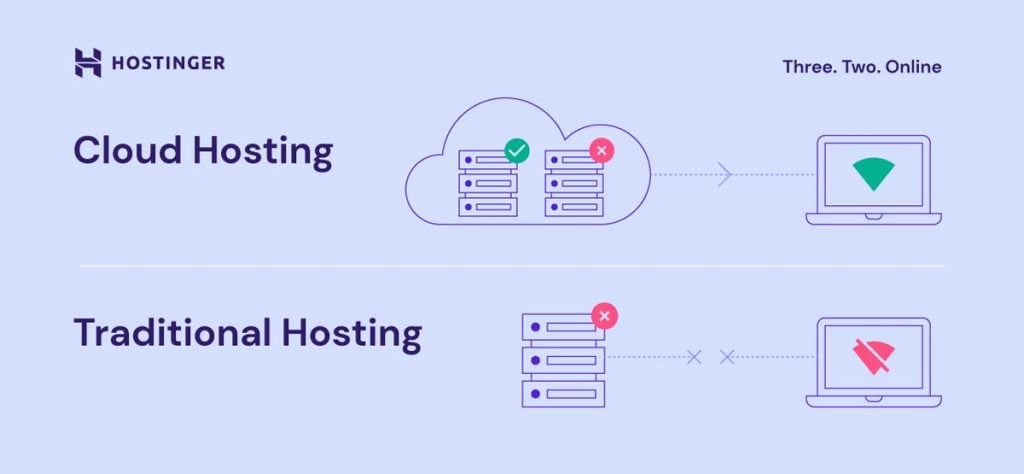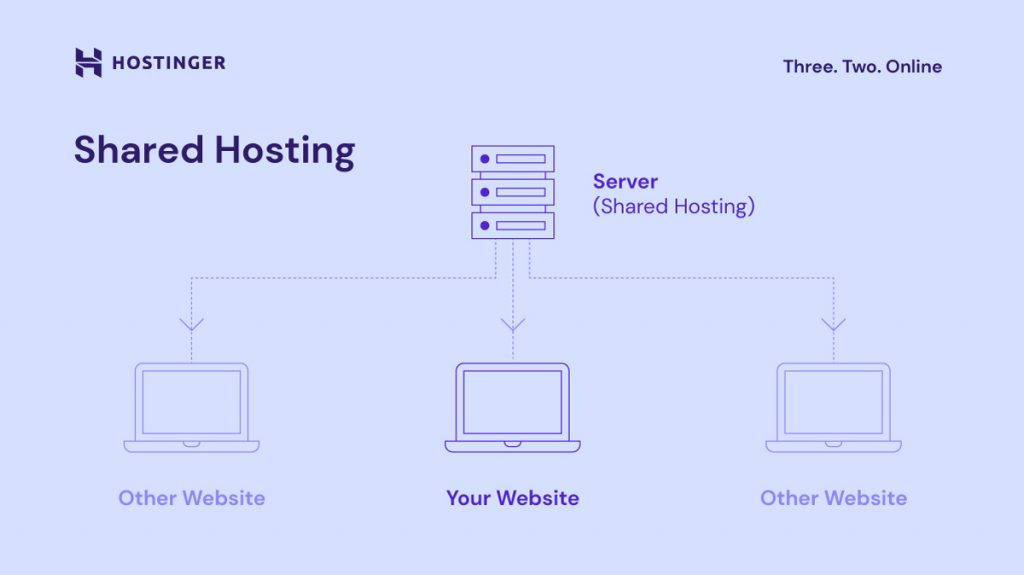What Is Cloud Hosting, How Does It Work, and When You Should Use It

If you want to create a fast, secure, and scalable website, cloud hosting is a great choice.
Instead of sharing computing power with other websites, you’ll get a bigger resource pool. This ensures stable performance and speedy content delivery for a better user experience.
This article will explain cloud hosting, how it works, and how it compares to traditional web hosting services. We’ll also discuss whether cloud hosting is the right solution for your needs.

What Is Cloud Hosting?
Cloud hosting is a web hosting service that uses the power of server virtualization. It ensures high uptime and fast performance for your website.
How Does Cloud Hosting Work?
Cloud hosting works differently from traditional web hosting. The latter typically uses a centralized approach, where a single web server hosts multiple websites.
Since computing power and storage are shared among traditional hosting users, a sudden traffic spike from a neighboring site can slow down your website.
In contrast, cloud hosting services use virtualization, which divides a physical server into multiple virtual servers. It uses a network of servers to host a website, ensuring better performance and stability than single-server hosting services.
As such, cloud hosting is suitable for high-traffic websites like eCommerce stores.
Benefits of Cloud Hosting
Whether you’re planning to host your first website or upgrade from a traditional hosting plan, cloud hosting offers plenty of benefits.
- Beginner-friendly. A managed cloud hosting solution doesn’t require any technical knowledge. The service provider will maintain the cloud servers and your site’s backend.
- High availability. When a server fails, another one in the network will act as a backup, keeping your website online at all times.
- Traffic load balancing. Traffic-handling responsibilities are spread across cloud web servers to maintain high performance.
- Scalability. Unlike traditional hosting services, site owners don’t have to share their bandwidth, data storage, and computing power. The web host provides virtual resources for each user, making it easier to scale their website.
- Greater security. Since cloud hosting services use multiple virtual machines, it’s less prone to hardware malfunctions. Moreover, the load balancing feature can help prevent DDoS attacks.
Comparing Cloud Hosting to Other Types of Hosting
Cloud hosting is a great choice, but it’s not for everyone. Some users may need advanced customization, while others prefer a more affordable option.
To help you choose the right hosting plan, we’ll discuss other popular hosting service types and how they compare to cloud hosting.
Cloud Hosting vs Shared Hosting
In a shared hosting environment, one server stores data from multiple websites. It results in limited bandwidth, storage capacity, and processing power.
Since the server maintenance costs are divided between users, shared hosting is usually less expensive than cloud hosting. As such, it is an excellent option for small businesses and personal websites.
Here are the pros and cons of shared hosting:
Pros
- Affordable. At $2-10/month, shared hosting is the least expensive hosting type. In comparison, cloud hosting costs $10-70/month or more. Check out our web hosting cost guide for more information.
- Beginner-friendly. No coding skills are required to get your website up and running.
- Easy maintenance. The web host handles the technical aspects of maintaining a website so that you can focus more on optimization.
Cons
- Limited resources. With limited bandwidth, processing power, and storage capacity, achieving top-notch website performance is difficult.
- Prone to security risks. If one site hosted on the shared server is compromised, the others may be affected.
- Shared IP address. You’ll need to share an IP address with other sites. This can hamper your email deliverability, as providers like Gmail and Yahoo tend to associate shared IPs with spam.
Cloud Hosting vs VPS Hosting
Virtual private server (VPS) hosting works similarly to cloud hosting. It uses virtualization to separate server partitions, providing each user with allocated resources to grow their website.
This hosting solution also offers root access, giving you more flexibility and control over the hosting environment. This feature is not available with managed cloud or shared hosting services.
However, VPS hosting is often self-managed by the user, making it more suitable for tech-savvy individuals.
Below are the advantages and disadvantages of VPS web hosting:
Pros
- Stable performance. Since each user gets dedicated resources, traffic surges on one website will not affect the others.
- Highly customizable. In terms of server configuration, virtual private servers offer more flexibility than managed cloud-based services.
- Dedicated IP address. VPS and cloud hosting providers offer a dedicated IP address for better protection. Having a dedicated IP address also improves your site’s credibility.
Cons
- Not beginner-friendly. Users must possess the required skills and knowledge to manage VPS hosting.
Suggested Reading
If you want to understand how hosting websites on VPS works, check out our guide.
Cloud Hosting vs Dedicated Server Hosting
Dedicated hosting is the most powerful type of hosting. It gives you full control over an entire server – from installing custom software to using all the available resources.
However, it is significantly more expensive than cloud hosting. As a result, it’s more geared towards large organizations with a big budget.
Check out the benefits and drawbacks of dedicated hosting:
Pros
- Top performance. Dedicated hosting offers the best site performance.
- Unlimited resources. With a dedicated server, you will have all the necessary resources to grow a large-scale website.
- Complete control. Users can fully control the hosting environment, including customizing the operating system and installing server-wide software.
Cons
- High cost. Compared to other hosting plans, dedicated servers have the highest maintenance cost. Expect to spend between $80-500/month or more.
- Advanced skills required. Server management knowledge is necessary to operate and maintain a dedicated server.
When Should You Use Cloud Hosting Solutions
Cloud hosting is the right option if you need a stable website performance but don’t have the necessary skills or budget to maintain your own server.
The distributed infrastructure helps you deal with traffic spikes during promos, seasonal events, or when an article suddenly ranks first on Google.
Moreover, it’s more suitable for websites that need more processing power, bandwidth, and disk space to handle large data. Some website types that would benefit from cloud hosting are news publications, large-scale blogs, search engines, and aggregator sites.
Cloud hosting is also excellent for websites that require top-notch security to protect sensitive data, such as eCommerce stores and social media networks.
Additionally, combining cloud hosting with a CMS like WordPress for creating enterprise websites offers an unparalleled blend of flexibility, scalability, and ease of use. This powerful combination provides a solid foundation for businesses looking to build robust, high-traffic online platforms.
Does Hostinger Offer Cloud Hosting Services
Yes, we do. Hostinger offers three plans ranging from $9.99/month to $29.99/month.

We use the latest cloud computing technology to ensure the best performance, such as CloudLinux with LVE containers. Your site will always be up and running with a 99.9% uptime guarantee and a global chain of data centers.
To help you choose the right plan, here’s a comparison of our cloud hosting options:
| Features | Startup | Professional | Enterprise |
| Pricing | Starts at $9.99/month | Starts at $14.99/month | Starts at $29.99/month |
| Number of websites | 300 | 300 | 300 |
| Number of email accounts | 100 | 100 | 100 |
| Memory | 3 GB | 6 GB | 12 GB |
| SSD storage | 200 GB | 250 GB | 300 GB |
| Number of CPU cores | 2 | 4 | 6 |
| Bandwidth | Unlimited | Unlimited | Unlimited |
All our hosting plans include a 30-day money-back guarantee, giving you peace of mind during the trial period. Visit the Hostinger coupons page to claim your cloud hosting discounts.
How Do IaaS, PaaS, and SaaS Relate to Cloud Hosting
IaaS, PaaS, and SaaS are business models that use cloud infrastructure to deliver their services. Let’s explore the differences between each model.
IaaS
IaaS stands for infrastructure as a service. This business type offers cloud-based computing resources such as servers and cloud storage to help companies run their operations.
Since building a physical data center is costly and difficult, many organizations buy from IaaS companies instead. Scaling cloud services is easy, and businesses only need to pay for the resources they use.
A prime example of an IaaS company is Amazon Web Services, a cloud computing platform that stores Netflix’s movie and series database.
PaaS
PaaS is short for platform as a service. It refers to a company that offers cloud-based frameworks for web and mobile apps.
Unlike IaaS, this vendor type manages the cloud server resources. Therefore, the developers can focus on creating projects.
Google App Engine is an example of a PaaS. With this service, users can create software without worrying about infrastructure management.
SaaS
Software as a service or SaaS is a business model offering full-fledged software on a subscription basis.
SaaS products are hosted in the cloud, unlike on-premise software that requires in-house servers. They’re accessible from any computer or mobile device with an internet connection.
This way, small business owners can access enterprise-grade software without making a large upfront investment. The Google Workspace suite, which includes Google Workspace webmail, is an example of a SaaS platform.
Conclusion
Cloud hosting employs a virtual infrastructure of servers to manage a website. Compared to traditional web hosting, it offers increased reliability and minimized hardware failure risks. This results in stable site performance.
Cloud-based web hosting is perfect for building large-scale projects, including enterprise websites, eCommerce stores, social networks, and aggregator platforms. Moreover, a managed cloud hosting service doesn’t require technical knowledge.
What Is Cloud Hosting FAQs
Here is more information about cloud hosting.
What Are the Best Cloud Hosting Providers?
There are many excellent cloud hosting providers available, such as Hostinger. Every provider offers a range of services and features, including flexible pricing models, scalable infrastructure, and reliable performance, to meet the needs of businesses of all sizes. So, check the different plans available before choosing.
How Do I Choose a Cloud Hosting Provider?
When choosing a hosting provider, consider factors such as pricing, performance, scalability, reliability, security, and customer support. Assess your specific business needs and goals, and compare the offerings of multiple providers to find the best cloud hosting. Look for customer reviews and testimonials to gauge user experiences and satisfaction.
How Do I Set up a Cloud Hosting Account?
To set up a cloud hosting account, choose a provider, select a plan that meets your needs, create an account, and provide payment information. Then, configure your server settings, upload your website files, and point your domain to the server. Finally, test your website to ensure it’s working properly.
What Are the Steps to Migrate to Cloud Hosting?
To migrate to cloud hosting, start by selecting a provider and plan that suits your needs. For example, Hostinger offers three different plans for cloud hosting. Then, assess your current environment, migrate your data to the cloud, and configure your applications and settings.




Comments
March 09 2020
Regarding your cloud hosting - is it public cloud hosting or private cloud hosting. If private - does it use dedicated or shared hardware.
March 12 2020
Hi Catherine, Check out Hostinger's different Cloud Hosting Plans (https://www.hostinger.com/cloud-hosting) and see which one works best for you :)
March 16 2020
Hi good morning I just wanna know if any for your hosting plans I can deploy Laravel projects?
March 19 2020
Hi Juan, You sure can! Our Automatic Script Installer will help you install the latest version of the Laravel PHP framework with ease and you will be all set and ready to develop your website using the framework. :)
March 30 2020
Hello i have question for Is the backup space deducted from the storage space? If the discount is, how much space can I use?
April 21 2020
Hello Hussain, your storage does not increase due to your backups. So you will have the exact amount of storage as shown when purchasing the plan.
April 12 2020
Hey there, Can Cloud Hosting use SSH? LIKE VPS can install softwares by self? On the other hand, does Cloud Hosting have root privilege?
April 13 2020
Hey! You can use SSH on all cloud hosting plans, however, you will have root privileges only on VPS.
August 05 2020
Hi, Where are the locations of the cloud servers. And can I chose the location I need?
August 25 2020
Hey there Anas! :) Yes you can - you can pick the location when you setup the plan! :) As for the server locations, Our servers are deployed in 7 different regions: UK, US, Brazil, Netherlands, Singapore, Indonesia and Lithuania. You can check that out here!
August 24 2020
Do u provide extra malware protection for WordPress sites...
November 06 2020
Hey Deepak! :) You can check our security measures here.
September 14 2020
hi!. If I publish my website, and it does not receive any visitors (_bandwidth, not used_), do I have to pay at the end of the month?
November 11 2020
Hey Ben. The price is paid for the usage of the server itself, regardless of bandwidth used. Our Cloud Plans have unlimited bandwidth so we don't take bandwidth into account at all.
September 17 2020
Hi, Does cloud server includes cPanel accounts and WHM panel or you have your own cPanel where I can set up independent websites or it is just addon websites?
November 11 2020
Hey Cesar. Our Cloud Hosting plans come with our custom hPanel, and all the extra domains you add are addon websites. They are independent of each other, in a separate panel section, with separate features, but you don't get separate cPanel login for them.
October 13 2020
Hi, can I create subdomains using the cloud hosting plan and these subdomains inherit the SSL from the main domain? cloud hosting can be use as a shared hosting too?
February 02 2021
Hi, Adrian! Yes, you can create subdomains for free with your Cloud plan; here's how ;) Then to install SSL, each domain/subdomain is a new website, so it requires a new SSL.
November 24 2020
Is the Cloud Hosting being used in the same way as regular VPS? Can I just install preferred Linux distribution on it and run Minecraft server?
February 09 2021
Hello, Rafal! For Cloud hosting plans here on Hostinger, the server-side settings are managed by us (similarly as for Shared hosting service), while VPS plans are fully managed by the user. So if you're looking to run Minecraft server, you'd be looking at VPS plans ;)
December 06 2020
Hey, Can I run WP and have a hpanel for free on a Cloud hosting server?
February 09 2021
Hi there! Yes, Wordpress can be easily installed on a Cloud plan from Autoinstaller ;)
December 13 2020
Can i host a nodejs and mongdb in the cloud?
February 09 2021
Hi there! So in this case, as you need nodejs as well, I'd suggest a VPS plan. You can check them at hostinger.com/vps-hosting :)
June 22 2021
Is cloud hosting suitable for displaying home furniture and high-quality images, a lot of visitors, more than 5 thousand per day.
September 16 2021
Hi Ahmed! The correct plan for you really would depend on the website's setup and optimization. The best way to look at this would be to check the current usage of your website (disk space, RAM, CPU, processes, etc.) Then compare that to which of Cloud plans offer that at hostinger.com/cloud-hosting If you'll need any further help on choosing the best plan for you, don't hesitate to contact our Customer Success team!
August 26 2021
can we hosting spring boot application (java) in cloud hosting
September 20 2021
Hi there! I've looked at Spring Boot requirements and I see that it looks like you would not be able to host it on a Cloud plan on Hostinger, but I would suggest having a look at VPS :)
September 20 2021
What backend frameworks or technologies does cloud hosting support?
September 21 2021
Hi, Hostinger Cloud plans support anything that is based on PHP, similar to Shared hosting. If you need root access though, you should go for a VPS plan instead. You can check further comparison of VPS vs Shared here (in regards to what is supported, think of Cloud as Shared plans). If you'll have specific questions about your framework, don't hesitate to reach out to our Customer Success team!
January 28 2022
Hi Will I experience any issues with a Cloud hosting plan because of my location (South Africa). Given you do not have servers near my region.
February 04 2022
Hi Joshua, to ensure the best speed, I would suggest to setup a CDN, which will store a copy of your content in cache and deliver the content from the server, located the closest to you.
January 29 2022
Thank you for such a fine effort. What neat work!
April 29 2022
It is well explained , thank u
November 04 2022
Hi, Can I use Cloud hosting together with CDN?
November 18 2022
Hey! You absolutely can, you can check out this article to learn how to setup a CDN for your website!
May 06 2024
What is the exact backup plan you provide with your professional cloud hosting program?
May 08 2024
Hi, Akshita! Our Professional Cloud Hosting plan includes a robust backup solution to ensure your data is safe. It features automatic weekly backups and the option for daily backups, allowing you to restore previous versions of your website whenever needed. These backups are kept for a specific period, ensuring you have access to previous data points to safeguard against data loss or corruption 😉